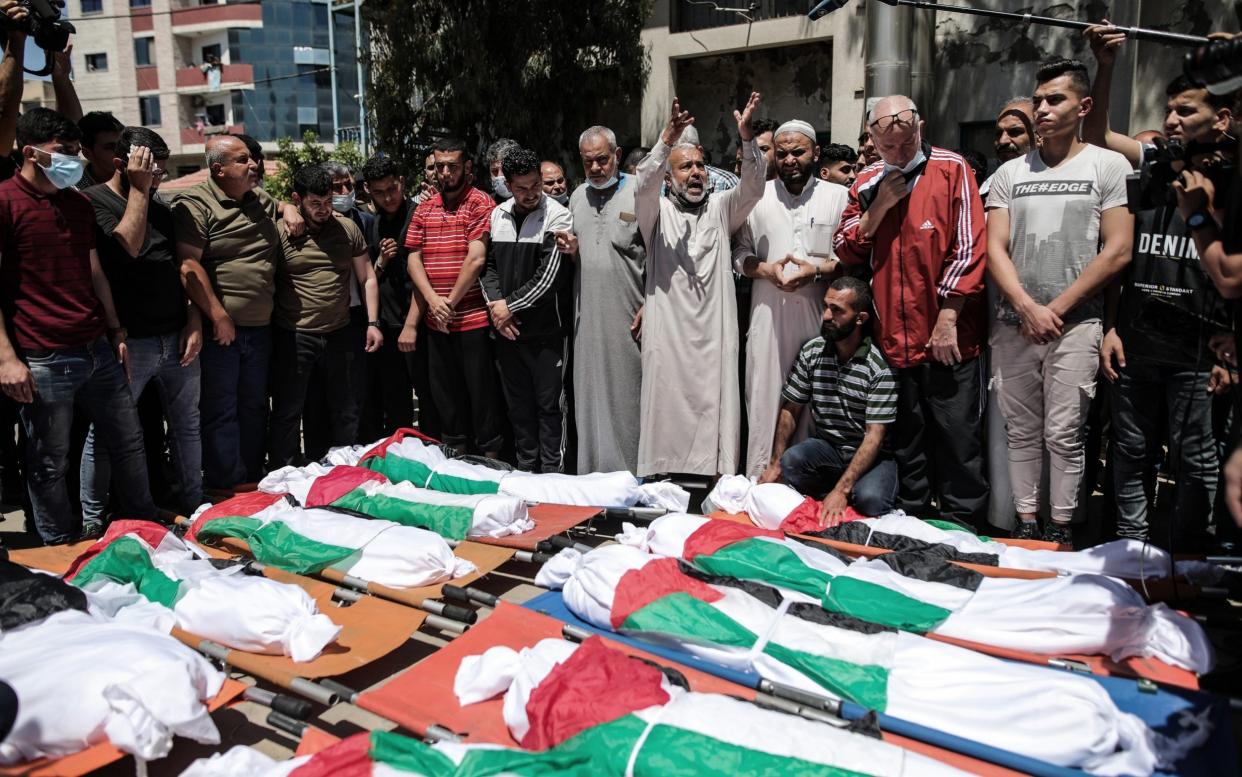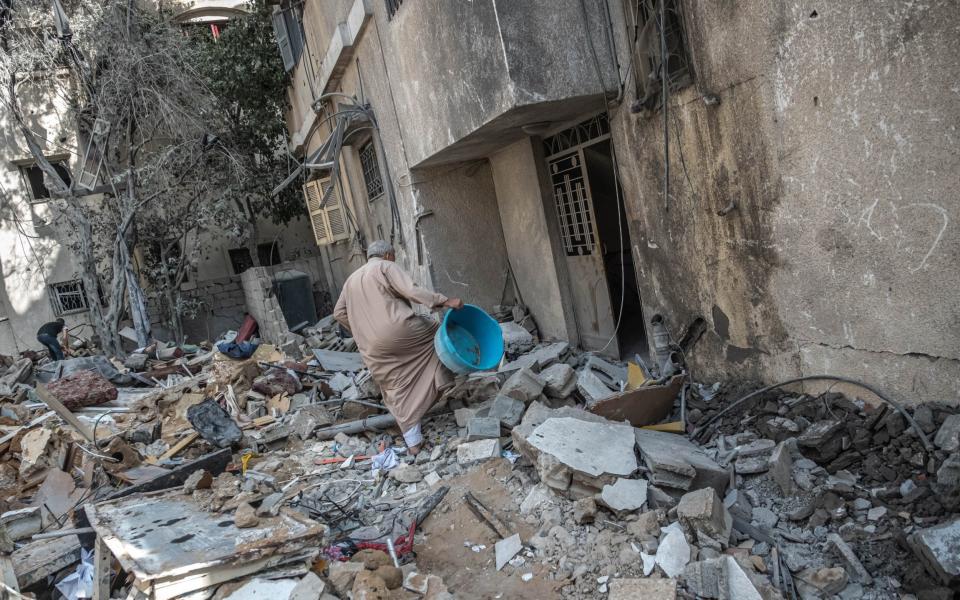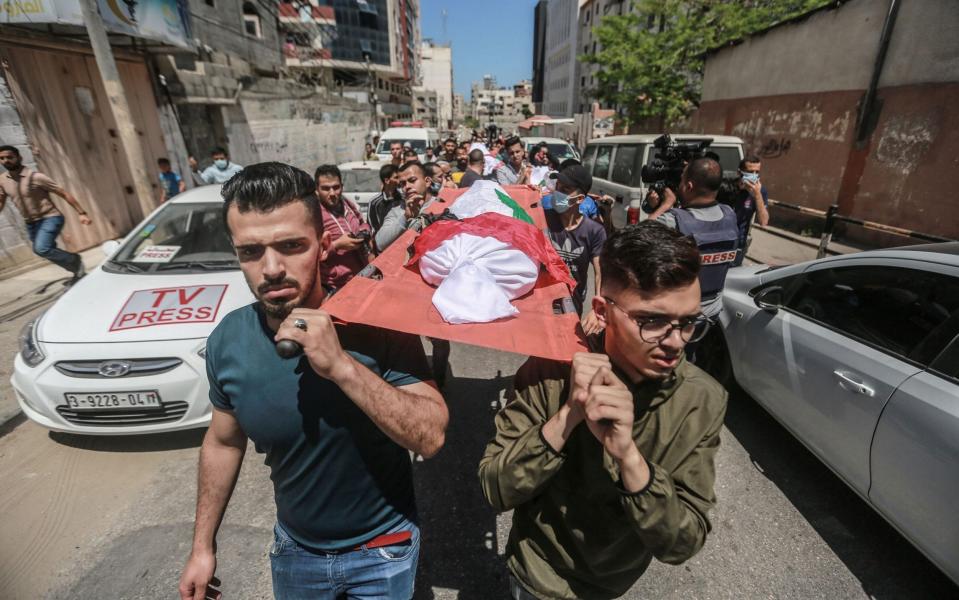'I saw a massacre', says uncle of Gaza family of nine killed in Israeli airstrike

- Oops!Something went wrong.Please try again later.
When Abu Anas Al-Hadidi heard the bombs fall on Shati refugee camp, Gaza, he immediately feared for his nephews. He arrived at a scene of abject horror, where people were digging into the rubble with tools and their bare hands as they desperately tried to retrieve people from the wreckage.
The house was destroyed, and all four of Mr Hadidi's nephews had been killed: Suhayb, Yehya, Abdel Rahman and Osama, who was just six years old.
"I saw a massacre, I was shocked," Mr Hadidi told the Telegraph. "The dead were pulled from one room out of the rubble, it seems they had been staying together in the same room."
As Mr Hadidi went to the morgue to identify the bodies, his brother stayed behind to help with the rescue efforts.
Five other members of the Abu Huttub family, who were also in the house, had been killed, bringing the death toll of the extended family to nine. Alaa Abu Huttub, the house's owner, was still missing as of Monday night.

However, there was one survivor: five-month-old Omar al-Hadidi, who was found in his dead mother's arms. Israel says the camp was hit during airstrikes on several high-ranking Hamas officials and their supplies, claiming that the Islamist group had used families in the area as "human shields."
Though the Israeli military says it takes care to avoid civilian casualties, such as by sending advance warnings of its attacks, Mr Hadidi said his relatives "did not receive any warning from the Israeli side."
As the conflict in Gaza enters its second week, Israel has launched hundreds of air and artillery strikes on what it says are Hamas targets and infrastructure, such as rocket launchers and underground tunnels.
The Israel Defence Forces (IDF) has been phoning residents in targeted buildings to allow time for them to evacuate, while it also carries out "roof-knock" attacks, where a small bomb or object is dropped on a building to forewarn its residents.
But as the death toll on the Palestinian side rose to 200 on Tuesday, including 50 children, the IDF is increasingly facing questions over its conduct during strikes on civilian areas.
The British government on Monday urged Israel to ensure its attacks in Gaza were “proportionate,” adding that it was “deeply concerned” by UN reports that 23 schools and 500 homes had been destroyed.
A spokesman for Boris Johnson said he was also concerned by an Israeli strike on a building which contained the offices of US news agency Associated Press and the broadcaster Al-Jazeera, and was “urgently seeking more information” on the attack.
Benjamin Netanyahu, the Israeli prime minister said on Monday night: "We are going to continue hitting targets in Gaza. We will continue to act as much as needed to restore calm."
In addition to the strike that levelled houses in Shati, Israeli forces destroyed three residential buildings in Gaza City on Sunday, in what proved to be the deadliest day of the conflict so far.
The IDF said it was targeting underground Hamas tunnels in the area and that their destruction led to the foundation collapsing beneath the residential buildings.
This led to the deaths of 42 Palestinians, including ten children, with many others trapped under the rubble. Rescue workers were intermittently turning off diggers so they could be guided by the screams of people trapped underground.
“My family and I closed our ears and lied on the ground, the house shaked rapidly, when it was over, we didn't believe we were still alive,” said Omar Saleh, a 20-year-old survivor of the attack.
“We smelled smoke and saw black fumes and fires. I called my friend, Abdel Hamid Elkolak who lives there to check on him, but alas I knew he was gone forever.”
Mr Elkolak was later confirmed as being among the victims of the attack.
As the conflict continued on Monday, Israel said it had killed a senior commander of Islamic Jihad, a Palestinian militant group, and had also struck a “submergible vehicle” which it said Hamas was using to mount an attack.
In Gaza, Hamas continued to launch rockets at Israel, though its fire was mainly concentrated on border towns such as Ashkelon, rather than Tel Aviv.
Israeli officials also said that, for the time in the conflict, they were facing a combined assault by Hamas of both drones and rockets, which the Iron Dome system was engaging simultaneously.
In the United States, Antony Blinken, the secretary of state, said on Monday that he had not seen any evidence of Hamas operating in a tower of media offices that was destroyed over the weekend by the Israeli military.

"Shortly after the strike we did request additional details regarding the justification for it," Mr Blinken said.
He declined to discuss specific intelligence, saying he "will leave it to others to characterise if any information has been shared and our assessment of that information."
"I have not seen any information provided," he added.
However, in an interview with CBS News the previous day, Mr Netanyahu said that Israel had shared intelligence with Washington about Hamas involvement.
It was unclear last night whether the evidence had been shared with Washington and Mr Blinken simply had not seen it, or whether no such evidence was supplied.
The Daily Telegraph approached the Israeli government for comment but did not immediately receive a response.
Both France and Egypt reiterated calls for an urgent end to the violence on Monday, but the Israeli government has indicated that it has no plans for a ceasefire in the near future.
At a meeting in Paris, French President Emmanuel Macron and Egyptian President Abdel Fattah al-Sisi agreed it was "absolutely necessary" to end hostilities.
Egypt says it is trying to negotiate a ceasefire between Hamas and Israel, but so far has had no success.

